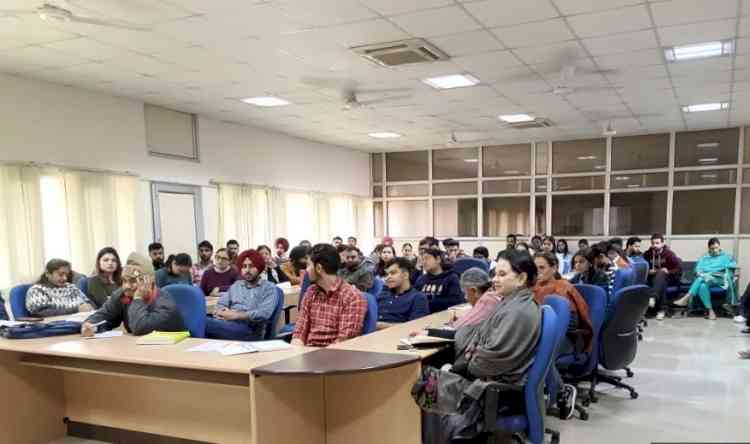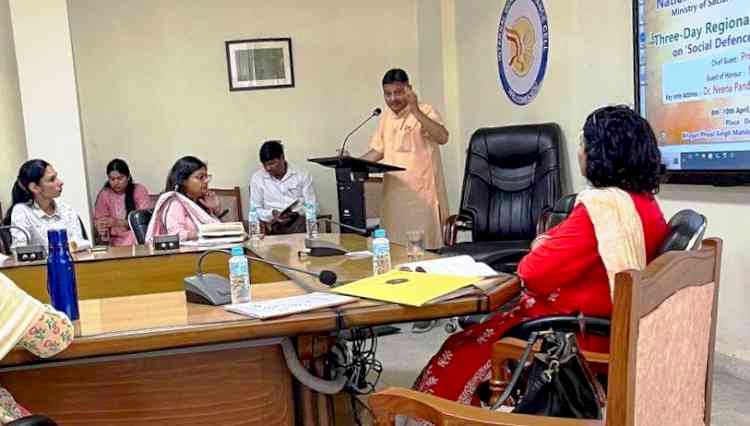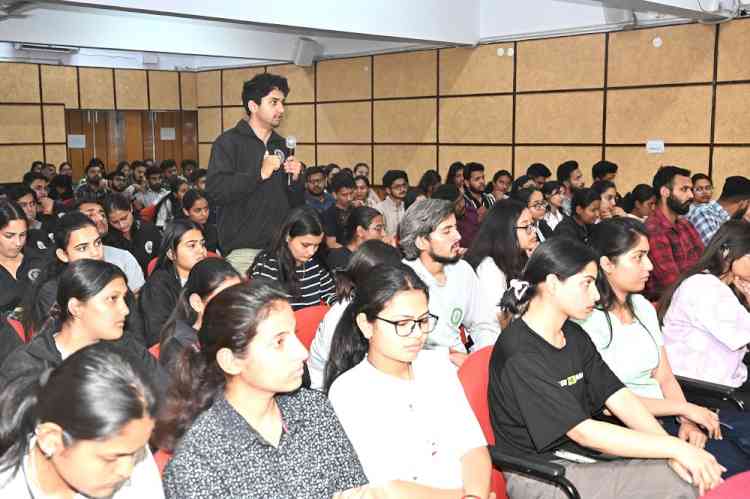Panel Discussion on theme- Reservation for Women in Parliament: Trials, Travails and Future Trajectory
In the wake of the enactment of the Women’s Reservation Act and ahead of the forthcoming Parliamentary elections, a Panel Discussion on the theme- Reservation for Women in Parliament: Trials, Travails and Future Trajectory was organized by the Department-cum-Centre for Women’s Studies and Development, Panjab University, Chandigarh today.

Chandigarh, February 15, 2024: In the wake of the enactment of the Women’s Reservation Act and ahead of the forthcoming Parliamentary elections, a Panel Discussion on the theme- Reservation for Women in Parliament: Trials, Travails and Future Trajectory was organized by the Department-cum-Centre for Women’s Studies and Development, Panjab University, Chandigarh today.
Welcoming the distinguished Panelists, Prof. Manvinder Kaur, Chairperson of the Department highlighted the long struggle for women’s empowerment, which is crucial as women have been absent from decision-making. Guaranteed equal rights by the Indian Constitution, women in India continued to remain a miniscule proportion of members in the National Parliament and State Legislative Assemblies.
Moderating the discussion, Prof.Pam Rajput, Professor Emerita, Dept-cum-Centre for Women’s Studies and Former Chairperson of the Committee on the Status of Women in India questioned whether there can be development when women are absent from the decision-making table. She shared with the participants that the founding mothers in the Constituent Assembly had not been in favour of reservation for women and in fact Renuka Ray had stated that it would be an insult to the dignity of women. But when Prof.Rajput again asked her opinion on the issue years later, Renuka Ray had changed her stance and said reservation was needed. At the time of the framing of the Constitution, the women members had thought that they would automatically get a space in decision-making once the nation was independent. These women were betrayed because women remained missing from decision-making. India, she informed the participants has 1.4 million women in the local bodies which is a huge ‘democratic investment’. She further stated that prior to the current Act being enacted, at least 14 attempts had been made to enact it. She concluded by deploring the terminology used to refer to women politicians, such as parr kati.
Professor Krishna Menon, from the School of Human Studies, Ambedkar University, Delhi began her presentation by emphatically declaring herself to be in favour of reservation for women, although she accepted that there had been divided voices in the women’s movement earlier regarding whether there should be reservation for women or not. Dr.Muthulaxmi Reddy the first woman legislator in India had at first been in favour of reservation, but had later changed her opinion. She quoted a male member of the Constituent Assembly as saying that reservation for women is a very bad idea as it would ruin Indian civilization. Reservation was necessitated by the need for representation, increasing the presence of women as well as an affirmative and transformative remedy. Women, she said, don’t need to be venerated, but to get their rights. They do not need patronage. The strength of the women’s movement is essential to ensure the effective implementation of the Act. The major problem which she saw in its implementation was that there is no singular entity called a “woman” A woman occupies many identities based on her place in society. Women’s rights are not independent of the overall context of society in which women face domestic violence, a dismal work participation rate, have low access to various facilities as well as suffer from lack of role models. Women have to be empowered to make their own decisions.
Prof. Devinder Singh, Chairperson, Department of Laws, Panjab University, Chandigarh stated that he does not favour the word reservation, but believes in empowerment. The imposition of gender roles leads to lack of empowerment and this mindset is continuing. The present Act aims to not merely provide reservation but to empower women. The members of the Constituent Assembly were activists and so against reservation, feeling that empowerment would come automatically with freedom. He also highlighted the difference in mindsets toward male and female panchayat members where when the male works with assistance of others he is commended, but when the woman does the same she is criticized. Women, themselves, he asserted need to become active, because the train was missed in the Constituent Assembly. He concluded by stating that we need to focus on three factors- aspire, achieve and distribute.
Manraj Grewal, Resident Editor of the Indian Express, also expressed her qualms regarding using the term reservation for women, stating that it seems like a dole. The need she sated is evident from the status of women. Speaking from her own experiences, she stated that she had seen a number of villages where families had only one child, that too a male child. Women’s labour force participation continues to remain low. To say that women do not need reservation is like living in a fool’s paradise. Women need to bring their perspectives into policy-making, but are trained to look after the family. Women cannot know their capabilities till they are given the chance to show these. The role of the media in this is very important, because it needs to highlight different shades of opinion. She cited the example of a woman DC whom she had seen in Punjab performing her duties during the floods. The DC was rushing to her car to breast feed her baby whom she was carrying along in the car. Media, she concluded, should highlight such role models and the emancipation of the people.
Proposing the vote of thanks, Dr.Rajesh Kumar Chander, associate Professor in the Department stated that the Act brings with it a ray of hope in fostering an inclusive approach towards women’s participation. The Panel Discussion was attended by over 80 participants from across the University including senior professors, senators, research scholars and students.


 City Air News
City Air News 








